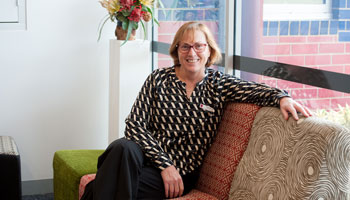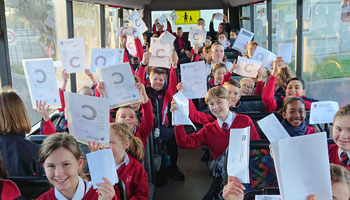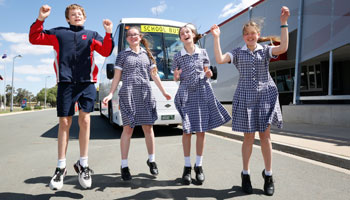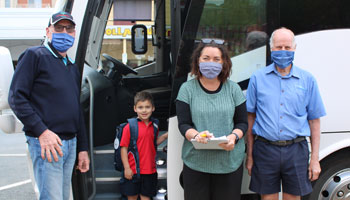Principal Carmel Spry thought her role was challenging until she found her school straddling the borders of NSW and Victoria in the heat of a pandemic lockdown.
I love where I live and work. This is a rural community on the Murray River, which is also the border between Victoria and NSW. We are an easy drive from Melbourne and the area swells every weekend with visitors. I am relatively new to the role of Principal and this year has been like a long-running crisis management exercise.
Moama Anglican Grammar is a co-educational school from Kindergarten to Year 12 with one campus in Moama, which means we operate within NSW. However, the majority of our staff and students live in Echuca in Victoria. Most of our students cross the NSW / VIC border daily via bus to travel to school. This system is managed by Victoria. It means we take school holidays and public holidays according to Victoria’s calendar because buses do not run outside of this time. The guidelines for safety during the COVID-19 pandemic have been state-based and as a border school, we have found ourselves straddling two worlds.

Principal Carmel Spry says the pandemic has strengthened the leadership team's ability to work collaboratively.
The first border closure created a few difficulties, the most significant challenge arrived when the NSW government restricted the border area further. The new area left us with about 120 students (from a school population of 650) and six staff who were unable to enter NSW to attend school.
This journey for all of us began in March with warnings from health authorities to be alert to cold and flu symptoms, particularly those who had travelled overseas, and to be vigilant with hygiene practices. Our primary goal throughout this time was the safety and welfare of our community. We wanted to keep the school running as ‘normally’ as possible for students, staff and families; we knew that to have some normalcy was important, particularly as our media reported on the number of cases and deaths each day.
During the June/July school holidays, the NSW Government announced that the border between NSW and Victoria would be closed. The NSW police with army personnel set up on the NSW side of the bridge and stopped every vehicle.
With every announcement from the government, either NSW or Victorian, our leadership team has met up to sort out what we needed to do in response. This has strengthened our ability to work collaboratively, to trust the judgment and reasoning of each person in the team, and our ability to make sound decisions quickly and communicate these clearly to our community.

Moama Anglican School students with their border passes as they crossed daily between NSW and Victroria.
Borderlines
The first border closure created a few difficulties, the most significant challenge arrived when the NSW government restricted the border area further. The new area left us with about 120 students (from a school population of 650) and six staff who were unable to enter NSW to attend school.
We had to find creative solutions to problems we had not faced before. We considered everything and discussed possible solutions around the table to find the best. We decided on a hybrid teaching model: both face-to-face teaching and online. The concern about this was for our teachers and their workload, the social connections for students at home and support for families.
We prepared the children for the process of the bus being stopped, police or army personnel boarding the bus and checking that every student was carrying a current border pass and bus pass as identification.
We faced challenges with students crossing the border; many experienced increased stress and anxiety, particularly primary children. Our teachers and the parents spent time talking to the children, we emphasised that no one was ‘in trouble’. We prepared the children for the process of the bus being stopped, police or army personnel boarding the bus and checking that every student was carrying a current border pass and bus pass as identification. Even with a lot of social stories in class and at home we had some students arriving at school distressed. We had several mornings when the buses were stopped, and students were asked to disembark and present their border pass. With help from our generous staff we have ensured that a teacher was also on the bus to support the students.

Borders open: students with the school bus organised by the school.
Frontlines
I spent a lot of this time on the phone and emailing government staff and politicians. We worked with state representatives in both NSW and Victoria, the cross-border commissioner in both NSW and Victoria. We made contact with NSW Health, Services NSW and Senator Perin Davey who lives in Deniliquin. In addition, we had support and assistance from Robyn Yates at AISNSW who was also working with government agencies on behalf of all independent border schools.
One of the challenges for us was the speed of change; governments were making decisions ‘on the run’ and we were trying to apply them in our context. We spent many hours discussing what we thought some of the directions for health and safety meant in practice. We have had staff and students who have attended specialist medical services that are not available in a community our size, who have then had to isolate for two weeks on their return before entering NSW again. We have done everything possible to support students and staff with leave, again our major priority has been to allow them to feel safe and cared for during this time.
One of the challenges for us was the speed of change; governments were making decisions ‘on the run’ and we were trying to apply them in our context.
Finelines
Our families have been very grateful that we have been able to keep the school running. Some families have been split by the border rules and children have been unable to spend time with one parent. We are very aware of the increased levels of mental health issues in students, staff and families and have increased our counselling resources to try to meet this need.

With help from generous staff the school ensured that a teacher was also on the bus to support the students.
We have had staff and students who have attended specialist medical services that are not available in a community our size, who have then had to isolate for two weeks on their return before entering NSW again.
We have been extremely fortunate; there has only been two or three cases of COVID-19 in our area. This has added to frustrations as we have felt removed from the centres of risk where decisions were being made. I do not think we will fully understand the impact of this virus for some time. Our region relies heavily on tourism and many families have suffered financial losses. The government support for business is also state-based and business in Moama is not eligible for Victorian government support for the long lockdown, yet their businesses rely on Victorian travellers. This will impact us in time.
During a workshop, another principal described the mood of his staff as ‘brittle’. This is a great description; we are all a bit brittle at this point and running out of energy, enthusiasm and resilience. This has required the leadership team to be more patient and understanding as our community struggles, to find moments of joy and to celebrate.
New to AISNSW and want to receive AISNSW Education News updates? Click here to register, and select ‘AISNSW Education News’ on the Areas of Interest/Subscriptions page.